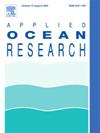Experimental investigation of flow and sediment transport on an equilibrium beach formed by surging breaker
Abstract
Flow patterns and sediment transport induced by breaking waves on a beach profile have been studied in a laboratory wave flume. Two parallel experiments were conducted on the same profiled rigid bed and sediment (mobile) bed, each subjected to identical wave forcing. The rigid bed experiments include measurements of bed shear stress and water-surface elevation, while the sediment bed experiments involve the measurement of pore-water pressures. The beach profile features a beach step leading to the generation of a hydraulic jump at the end of the rundown phase and accordingly forms a backwash vortex. The bed shear stress measurements revealed that the maximum onshore directed mean bed shear stress occurs after the wave breaking whereas the offshore directed one occurs during rundown at the same section. The increase of the bed shear stress with respect to that in the approaching wave boundary layer during the wave breaking and hydraulic jump processes can be by as much as a factor of 13 and 4, respectively. The effect of the wave breaking on turbulence is also more pronounced by a factor of 2.2 than the hydraulic jump in terms of r.m.s values of the fluctuating component of the bed shear stress. The pore pressure measurements showed that the vortex generated during the wave breaking creates an impulsive, upward-directed pressure gradient force that can be up to 1.2 times the submerged weight of the sediment. The sediment transport occurs in the sheet flow regime in a large part of the beach profile. The turbulence generated by the backwash vortex and the hydraulic jump at the beach step directly impacts the local sediment suspension which serves as the source for the advected sediment in the swash zone. The results are compared with a previous study that used the same methodology but involved plunging waves and the initial bed profile.

| 公司名称 | 产品信息 | 采购帮参考价格 |
|---|
 求助内容:
求助内容: 应助结果提醒方式:
应助结果提醒方式:


